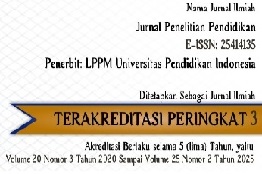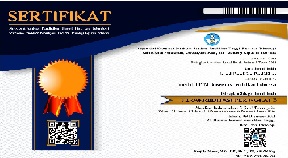Teacher Professional Development in Developing English Assessments Through TPACK
Abstract
Keywords
Full Text:
PDFReferences
Bakar, N. S. A., Maat, S. M., & Rosli, R. (2020). Mathematics Teacher's Self-Efficacy of Technology Integration and Technological Pedagogical Content Knowledge. Journal on Mathematics Education, 11(2), 259-276.
Chai, C. S., Koh, J. H. L., & Tsai, C. C. (2011). Exploring the factor structure of the constructs of technological, pedagogical, content knowledge (TPACK). The Asia-Pacific Education Research 20(3) pp. 595-603.
Gholson, M. L., & Guzman‐Orth, D. (2019). Developing an alternate English language proficiency assessment system: A theory of action. ETS Research Report Series, 2019(1), 1-19.
Sojanah, J., Suwatno, S., Kodri, K., & Machmud, A. (2021). Factors Affecting Teachers’technological Pedagogical and Content Knowledge (A Survey on Economics Teacher Knowledge). Jurnal Cakrawala Pendidikan, 40(1), 1-16.
Kimura, Y., Nakata, Y., Ikeno, O., Naganuma, N., & Andrews, S. (2017). Developing classroom language assessment benchmarks for Japanese teachers of English as a foreign language. Language Testing in Asia, 7(1), 1-14.
Mulyadi, D., Wijayatingsih, T., Budiastuti, R., Ifadah, M., & Aimah, S. (2020). Technological pedagogical and content knowledge of ESP teachers in blended learning format. International Journal of Emerging Technologies in Learning (iJET), 15(6), 124-139.
The Regulation of Minister of Education and Culture No. 81 A, (2013) Appendix IV –Implementation of Curriculum as Teaching-Learning Guidance
Twining, P., Raffaghelli, J., Albion, P., & Knezek, D. (2013). Moving education into the digital age: the contribution of teachers' professional development. Journal of computer assisted learning, 29(5), 426-437.
DOI: https://doi.org/10.17509/jpp.v22i2.48687
Refbacks
- There are currently no refbacks.
Copyright (c) 2022 Jurnal Penelitian Pendidikan
ISSN: p.1412-565X e.2541-4135
Jurnal Penelitian Pendidikan (JPP), Universitas Pendidikan Indonesia 
This work is licensed under a Creative Commons Attribution-ShareAlike 4.0 International License


